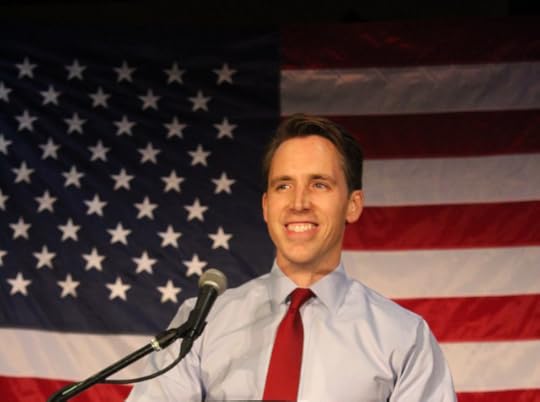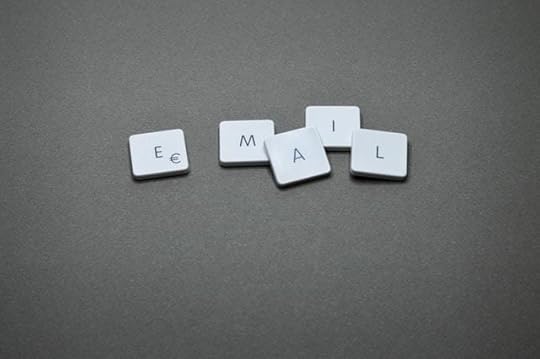Cal Newport's Blog, page 26
June 27, 2019
Senator Hawley on Social Media: “addiction is actually the point.”
 Photo by Natureofthought.
Photo by Natureofthought.Early last month, Josh Hawley, the newly-elected senator from Missouri, gave a speech about big tech at the Hoover Institute. He made a couple points that caught my attention, such as when he said this:
“Social media only works as a business model if it consumes users’ time and attention day after day after day. It needs to replace the various activities we did perfectly well without social media, for the entire known history of the human race with itself. It needs to replace those activities with time spent on social media. So that addiction is actually the point.”
And this:
“This is what some of our brightest minds have been doing with their time for years now. Designing these platforms, designing apps that integrate with them. I mean, what else might they have been doing?”
I was pleased to hear Senator Hawley emphasize these issues of addictiveness and value because they echo the concerns I heard from the vast majority of people I met during the book tour for Digital Minimalism.
It’s important to hear public figures cite these problems, because as I’ve written before, much of the media coverage on the big tech backlash focuses on what I call legal-techno geek issues, such as privacy, data portability, and content moderation.
These are important topics, and if you’re a journalist, or a social media personality, or an academic, or a political think tank type, they can be quite exciting to debate and nuance. They also have the advantage of being addressable by big swing legislative fixes, which are satisfying to imagine. (Indeed, in the recent New Yorker review of Digital Minimalism, the reviewer’s main criticism was that I avoided suggesting such systemic fixes.)
But for the average person — who doesn’t host a YouTube interview show, or cover politics, or publish research papers on network privacy — the legal-techno geek issues are not why they’re uneasy about their devices.
What they really care about is the fact that they’re looking at these glowing screens more than they know is useful or healthy, and to the exclusion of things that are more important. They care that their relationship with services like social media and streaming videos is leeching quality from their life.
So I think Senator Hawley got this right in his Hoover Institute speech. Which is why I was somewhat resigned to learn that just yesterday he introduced a piece of legislation that fell back into core techno-legal geek topics (in this case, regulating content moderation policies).
The listless and anxious 25-year-old, compulsively swiping and tapping his smartphone, bleeding away life force with each steam whistle tweet or Instagram artifice, won’t be helped if Section 230 of the Communications Decency Act of 1996 is repealed. But if this same 25-year-old learns exactly how his devices have been sapping his natural drive, and is shown what he might do about it, he will have a real shot at serious improvement.
We need more focus on what Senator Hawley talked about last month at the Hoover Institute, and probably a little less focus on the types of issues he’s now attempting to legislate. It’s not that the latter are meaningless, it’s just that fixing them won’t by itself provide meaning to those lost in their screens.
######
My long-time friend Scott Young has a new book coming out in August called Ultralearning . I’ve been talking with Scott about this book since it was still just an inkling of an idea, and I couldn’t be more excited about the way it turned out. I’ll provide a real review when it’s launched, in the meantime, however, if you’re thinking about it buying it, consider doing so early to reap the pre-order rewards Scott is offering (which include an interview with yours truly).
June 17, 2019
Naval Ravikant, Email, and the Future of Work
In a recent appearance on Joe Rogan’s podcast, Naval Ravikant referenced economist Ronald Coase’s 1937 paper, “The Nature of the Firm,” which later helped Coase win a Nobel prize.
The mathematical details of this paper are dense, but on Rogan’s show, Ravikant summarizes its core idea: firms hire more people instead of contracting out the needed work when the transaction costs associated with setting up external relationships are high, making it easier and cheaper to do the work internally.
As Ravikant notes, the internet is driving down these transaction costs as it reduces the friction required for an entrepreneur to find and hire the right contractor for a specific task. Coase’s theory predicts therefore that businesses will become smaller and more people will migrate from stable positions to a freelance lifestyle.
I was intrigued by this discussion because it overlaps with some concepts that I’ve been developing as I work on a new book about email and the future of work.
The book in question (which is still very much in the early stages) documents how in the 1990s, as digital communication tools like email swept through front offices, many organizations implicitly adopted a workflow I call the hyperactive hive mind.
This workflow has employees coordinate by maintaining an ongoing, unstructured electronic conversation through inboxes and (increasingly) Slack channels — essentially scaling up the way small groups in the same physical location would naturally work together.
The advantage of the hive mind is that it’s flexible and adaptive. (As Henry Ford learned as he developed the assembly line: rigid, complicated work processes are a huge pain.)
The disadvantage, however, is that the constant communication demands of the hive mind conflict with the way human brains function, significantly decreasing productivity and making people miserable.
My prediction is that in the near future we’ll see a movement away from the hyperactive hive mind workflow as more and more firms trade its simplicity and convenience for approaches to work that produce more value — even if they’re more rigid and annoying.
(As Henry Ford also learned, the pain of figuring out the assembly line was worth it, because it produced cars 10x faster than the easier methods it replaced.)
Which brings us back to Naval Ravikant and Ronald Coase.
I increasingly believe that one of the hidden impacts of the hyperactive hive mind is that it inflates external transaction costs. This happens because the hive mind has a way of muddying up internal work into countless informal requests and unstructured conversations, archived haphazardly into ad hoc collections of old messages.
In an age of Gmail and Slack, work has been largely reduced to employees opening up their inboxes and chat channels and then just rock n’ rolling — hoping that the cumulative impact of this back-and-forth busyness moves the needle in the right direction. It’s often not easy to extract clearly defined chunks of effort from this chaotic chatter.
If my prediction is correct, and we seem more firms moving away from the hyperactive hive mind toward more structured approaches to work, then it will suddenly become easier for them to contract with the external market.
This shift would amplify the Coase effect that Ravikant described on Rogan’s podcast, perhaps making the move toward smaller firms and more freelancing even more pronounced than expected.
I’m not sure if this is a good thing or a bad thing, but we should be aware of it. The more I study the future of work, the more I recognize the transience and fragility of the way so many of us currently approach our jobs (c.f., my recent take on the weird state in which academia currently finds itself).
If you’re striding confidently through the doors of your large firm, arriving early to get a jump on your inbox, smugly believing that after just a couple quick decades we’ve already mastered the most efficient ways to produce knowledge work in an age of computer networks, there are likely some big surprises in store for you in the years ahead…
June 4, 2019
Franklin Foer on Devoted Attention
 Photo by JR P.
Photo by JR P.Last month, Franklin Foer, one of my favorite techno-philosophers, wrote an essay for The Atlantic that caught my attention.
He revealed that he started a daily poetry reading habit to “sharpen the faculties that stare at the world,” with the aim to “bulwark my attention against the assault waged by my phone.”
He soon rediscovered the work of Mary Oliver, who died earlier this year. In reading her final poetry collection, Upstream, Foer was surprised to discover that Oliver helped him confront the very forces that had driven him to his bulwark-building poetry habit in the first place.
“The costs of allowing our attention to be commandeered remain drastically understated,” Foer writes, and though this might not have been her specific intention, Oliver’s “poetry captures its spiritual costs.”
Foer is drawn in particular to the title poem of the collection, which tells the story of a girl separated from her parents in the woods, who finds herself, perhaps for the first time, really noticing the world around her.
As Foer explains:
“The piece concludes with a sentence that implants itself in the brain, because it is, in fact, so far upstream from the way we live: ‘Attention is the beginning of devotion.’ And, of course, this is so. The unnoticed can’t possibly be loved.”
I stumbled across a related sentiment when researching Deep Work. In the chapter where I mull the existential significance of focus, I found myself, to my initial surprise, drawing on the philosophers Hurbert Dreyfus and Sean Dorrance Kelly’s secularized counterstrike against nihilism, All Things Shining.
In this book, Dreyfus and Kelly locate grounded meaning in craft. When you confront the physical world and struggle to manifest your intentions, you encounter attributes and properties — some good, some bad, some occasionally sublime — that exist distinct from your subjective, narcissistic episteme.
They point to the example of the wheelwright subordinated to the properties of wood that enable successful wheel shaping. In learning these truths, they argue, the wheelwright is encountering the sacred.
Both the poetry of Oliver and the philosophizing of Dreyfus and Kelly point toward a common truth: life cannot blossom into its true potential until you embrace the challenge of paying attention to what is in front of you right now.
The algorithmically-mediated alternatives presented through glowing screens will never spark the same devotion.


May 31, 2019
On the Pleasures and Sorrows of Life Without Screens
 Photo by Marketa.
Photo by Marketa.I recently received a message from a friend of mine, a young man named Mike. He told me that Digital Minimalism had changed his life. Naturally, I asked him to elaborate what he meant.
In response, he listed the following changes:
He lost 15 pounds and dropped his body fat by six percentage points; he went from being terrible at dancing to pretty good (he sent me a video of him in a dance circle to prove this claim); he developed a Brazilian Ju-Jitsu practice; he strengthened many relationships.
This list might seem surprising: my book is about technology, and yet none of the changes listed by Mike seem to have anything to do with social media or smartphone settings. But as I’ve learned over the past few months, his experience is actually quite common among those who take the minimalist plunge.
* * * *
When people contemplate the declutter process I suggest in my book, in which you spend 30 days away from optional technology as a prelude to simplifying your digital life, they often predict that the main challenge will be compensating for the benefits and features they’ll miss out on.
But this prediction is almost always wrong. Most people report that after a week or so of some mild withdrawal symptoms, they’re surprised by how little they miss the features of services like Twitter or Instagram.
The real problem — and this surprised me — is figuring out how to deal with all the free time this move toward minimalism suddenly injects into your life.
Here’s how a reader named Laurie described the experience of going through my digital declutter:
“I learned that a lot of actions in my day are mindless. We all have much more time than we think we do; we just fill it with lots of scrolling.”
…
“Here’s what I realized: I am addicted to using my phone, specifically, using my phone to curtail boredom during ‘free periods’ in my life…My problem, which is apparently common amongst people who have done this same digital fast, is that I didn’t have a good downtime activity to engage in.”
Another reader, a philosophy professor named Anna, put it this way:
“I was left with a lot of silence. What do I do in the evening after work when I’m home alone and really tired and it’s raining hard outside?…In the beginning, I spent a significant amount of time being bored. I wandered the house in circles looking for something to do.”
We convince ourselves that we use our phones to fill in occasional idle moments, but stories like Laurie and Anna’s point toward a more troubling conclusion. Perhaps we initially used our phones in this manner, but over time, their role expanded, subtly pushing aside other, more sustaining activities in our lives.
Like the once purely social drinker who ends up hiding empty beer cans from his family, all this tapping and swiping has a way of shifting from an occasional distraction to a default behavior. So when you finally remove it, you’re suddenly left with a whole mess of “silence,” just you and your feelings, and an uneasy sense of not knowing what to do next.
Which brings us back to Mike.
* * * *
Faced with the sudden stretches of free time generated by minimizing his digital life, Mike decided to aggressively fill in these blanks.
He began by following my recommendation from Chapter 4 to inject more solitude into his life. He deployed what he called the “AOB method” with his phone (as in “Airplane mode, Off, and in my Bag”), to force himself to regularly be alone with his own thoughts and start getting in touch with what he cared about, what he was missing, and, most importantly, what he wanted to do with himself.
Because Mike is young (in his 20s), much of his socializing happened online, so he also decided to take proactive steps to replace this sense of connection after minimizing his digital life.
To do so, he instituted regular “office hours” each week — prescheduled time periods during which his challenge was to connect with people he cared about, either in person or on the phone.
As Mike explained to me, he ended up getting back in touch with people he hadn’t really talked to in years, and the longform analog conversation fostered a sense of connection deeper than anything he had experienced in recent memory.
Finally, Mike made a list of the concrete personal goals he wanted to pursue. He recruited a “board of directors” — an expert mentor for each goal — to help direct him and hold him accountable. It didn’t take long before the accomplishments that opened this essay began to pile up.
Laurie and Anna had similar experiences.
Though Laurie reports she’s still looking to “develop a quality leisure activity,” she’s been investing heavily into real world interactions with her friends:
I’ve met with friends for lunch, hung out with friends casually, hung out with family casually, played tennis with friends, run with friends. I even spent a weekend away with my running friends from New Hampshire.
Anna, for her part, also parlayed her boredom into more meaningful activities:
“I wrote a letter to a friend who is struggling right now and I wrote cards to some graduating seniors at my college. I texted a friend and made plans for getting together over the weekend. I practiced yin yoga. And I went to bed early.”
She ended up cancelling the Netflix subscription she previously relied on to escape from life.
* * * *
This is all really hard work. It’s much easier to simply fill your time posting to Instagram or passively gorging on autoplayed video.
But Laurie reports a reduction in anxiety and stress, coupled with an improved mood.
Anna gave the following summary: “I noticed that I felt better. Calmer. More in touch with who I want to be and with what matters to me.”
And I’ve never seen Mike happier.
May 17, 2019
Novelist Mark Haddon Quit Twitter. Not Because It’s Terrible, But Because It Prevents Him From Being Great
 Photo by Luis Marina.
Photo by Luis Marina.Last week, the British novelist Mark Haddon wrote an essay for the Financial Times about his recent decision to take a break from Twitter. What I liked about this piece is that it unpacked a nuanced back-and-forth thought process about social media.
Many of the narratives surrounding these services stumble toward an extreme: social media ruined democracy! social media is more important than the printing press!
The people I talked to while researching Digital Minimalism, however, tended to report a more conflicted experience. Not unlike a once happy relationship that’s begun to sour, they can easily list things they like about services like Instagram or Facebook, but ultimately, with a shake of the head, they conclude that keeping it in their life is no longer sustainable.
This is the story Haddon tells.
The bulk of his article lists the many novelties and happy swerves of attention that Twitter provided him. But he still felt he needed to walk away. Why? Here’s his pithy explanation:
“I am taking a long break because every tweet had begun to feel like a peep of steam through my whistle — Listen to me! Listen to me! — which reduced the boiler pressure I needed to write another novel.”
And so it is in the real world with many who find their patience wearing thin with social media: it’s nice; it’s sometimes spectacular; but in the end, it has a way of bleeding away the steam of life, one interrupted moment at a time, until you find yourself no longer tackling the harder, analog, striving endeavors that make a good life good.
#####
Speaking of the pros and cons of social media, my friend (and immensely talented filmmaker) Rob Montz recently released a powerful, short documentary on the harm Instagram is causing among teenagers. Take a look.
May 5, 2019
On the Utility Fallacy
 Photo by Miguel Á. Padriñán from Pexels
Photo by Miguel Á. Padriñán from PexelsA few years ago, I wrote an article for the Harvard Business Review’s website about the excesses of email culture. In an effort to destabilize the perceived necessity of our current moment of hyperactive communication, I explored a thought experiment in which email was banished altogether and replaced with pre-scheduled office hours.
“Office hours might not work for every organization,” I wrote, “although, as I’ve argued, they would probably apply in more settings than you might at first assume.”
Given the semi-satirical undertones of this exploration, I gave a nod toward Swift in the article’s title: “A Modest Proposal: Eliminate Email.”
I’m bringing this up now because a reader recently pointed me to a Reddit thread from last month that discusses this older piece. Overall, the thread is varied and fascinating. I want to highlight here, however, a few comments that I think are representative of a general line of resistance I often encounter — usually from fellow engineering types — when I write negatively about new technologies:
“…people seem to severely underestimate how valuable it is to search past conversations, not to mention having a timestamp of when assignments and decisions got made”“I am totally with you here. Email is THE SUPERIOR tool for communication. People simply lack the discipline to manage their inbox.”“Having lower cost, lower friction communication is an absolute positive development.”
These points are an example of what I’ve come to call the utility fallacy, which is the tendency, when evaluating the impact of a technology, to confine your attention to comparing the technical features of the new technology to what it replaced.
From this perspective, email is self-evidently better than the memos, voicemails, and fax machines that it superseded.
But as I’ve learned in my years thinking and writing about such issues, when it comes to consumer-facing technologies, the more important story is almost always how they end up mutating our socio-cultural dynamics.
No one argues, for example, that it’s better to send an email than a fax. But the modern knowledge worker now sends 125 business emails a day, which works out to one every 3.85 minutes — vastly more back-and-forth communication than what was common in the pre-email era. One could certainly argue that this new behavior is not “better” in any useful sense.
You could retort that knowledge workers are, en mass, acting stupidly when using this new tool, and if they’d simply talk to an enlightened engineer about inbox management we’d all be fine. But I find this explanation both unlikely and condescending.
More plausible is the hypothesis that the introduction of low-friction communication disrupted the finely-tuned dynamical system mediating inter-personal office interactions, creating both unpredictable and unfortunate results (c.f., Leslie Perlow’s work on the cycle of responsiveness).
I’ve noticed a similar conflict in recent discussions about social media. When viewed through the lens of the utility fallacy, these tools are unambiguously good at allowing people to connect with each other and share information with minimum effort.
But this observation misses the fact that almost everything interesting about our current struggles with social media concerns the impact of these tools on our lives beyond the screen.
The point too often missed in a cooly instrumentalist understanding of technology is that we don’t use these tools in a vacuum; we instead participate in complicated social systems that can careen in unforeseen directions when powerful new technological forces are introduced. Features are important, but they’re not the whole story.
April 28, 2019
On Monks and Email

Medieval monks thought a lot about thinking. As University of Georgia history professor Jamie Kreiner elaborates in a recent Aeon article:
“Their job, more than anything else, was to focus on divine communication. For these monks, the meditating mind wasn’t supposed to be at ease. It was supposed to be energised. Their favourite words for describing concentration stemmed from the Latin tenere, to hold tight to something. The ideal was a mens intentus, a mind that was always and actively reaching out to its target.”
To accomplish this goal “meant taking the weaknesses of their bodies and brains seriously.”
They used complex visual mnemonic techniques to help structure complex information in their mind’s eye.
They deployed heavy labor and moderate diet to keep their physiology in an optimal state for mental work.
Even the monastic renunciation of worldly goods and relationships supported concentration: the fewer things going on your life, they reasoned, the fewer things to distract you while trying to think about God.
What struck me as I read this article is that in our modern world, we still maintain positions in which the ability to concentrate is crucial to success: high skilled knowledge work jobs, like computer programmers, lawyers, doctors, consultants, journalists and professors.
Except unlike our deep working medieval forebears, the modern knowledge work organization seems to care little about cultivating and supporting this fundamental activity.
We hook people up to email inboxes and Slack channels because it’s convenient. We justify Twitter addictions on the grounds that we need to be “part of the conversation,” and compulsively post to Instagram to bolster our “social media brand.”
But few organizations think seriously about thinking, which, after all, really is the fundamental value-producing activity in knowledge work, just as divine communication was the metaphorical money-maker for the pious medievals.
The monks were on to something. Concentration is hard work. It requires, for lack of a better word, more serious attention.
April 16, 2019
AOC Quit Facebook. The Media Bungled the Story.
 Photo by bruce mars from Pexels
Photo by bruce mars from PexelsOver the weekend, Alexandria Ocasio-Cortez announced on a podcast that she was quitting Facebook as part of her efforts to cut back on her social media use more generally.
This was big news because the 29-year-old AOC is famous for her skilled leverage of these platforms to connect with her constituents and drive the national conversation on issues she cares about.
What captured my attention more recently, however, is the apparent disconnect between the way AOC explained her social media moderation and the way the national media reported the story.
My hometown paper, The Washington Post, for example, lumped AOC in with WhatsApp co-founder Brian Acton and Steve Wozniak, noting:
“Both technologists parted ways with the social network amid a user boycott and as the company faced a congressional inquiry over the Cambridge Analytica controversy, when it was revealed that the political firm had improperly obtained personal information from millions of Facebook users.”
The same article then elaborated:
“After a rolling series of scandals involving the misuse of personal data, hateful content and misinformation, many Facebook users have also changed the way they use the platform”
Here’s the thing: misuse of personal data and hateful content were not the reasons emphasized by AOC for why she quit Facebook. She instead called social media a “public health risk” that too often leads to “increased isolation, depression, anxiety, addiction, escapism.”
I keep encountering this same mismatch between real social media users and the press coverage of these services when I’m out promoting Digital Minimalism.
The press coverage of our culture’s growing disillusionment with social media tends to focus — like the article cited above — on policy issues such as data privacy, or political issues such as the definition of hate speech.
By contrast, when you talk to actual users about their concerns with these services, they tend, like AOC, to instead talk about their addictive nature, and how this compulsive use keeps them away from activities they know are more meaningful.
When AOC mentions isolation, anxiety, addiction, and escapism, most heavy social media users know exactly what she’s talking about.
On the other hand, when the press reports on this issue, they’re more likely to turn their attention back to Cambridge Analytica — a phrase I almost never hear mentioned by the students, parents, teenagers, retirees, artists, coders, lawyers, entrepreneurs, and athletes I’ve been talking to about digital minimalism over the past three months.
Putting politics aside for the moment, we should applaud AOC for being so forthright about the complicated tensions generated by social media. These tools played a big role in her rise to national prominence, but they’re also diminishing the quality of her life (not to mention the quality of life of hundreds of millions of other users obsessively entangled with these apps). The issue here is not clear cut, but it also can’t be ignored.
To me, this is the real story about how the social media juggernaut is currently renegotiating its place in our culture.
I think we’ll all be better served once the national press recognizes this reality, and turns more of its attention from the spectacle of Mark Zuckerberg testifying about data privacy and AI-driven content review, and toward the more nuanced and more human issues encapsulated by the surprising story of a 29-year-old social media rockstar who finds it necessary to escape the very techno-world that made her.
In other words, the important story is not the fear that social media companies will improperly use our data; it’s instead the fear that they’ll subvert our primal drive to cultivate a meaningful life.
April 10, 2019
Digital Minimalism and Sports
A couple weeks ago, I posted an article in reaction to the news that the head coach of the Arizona Cardinals now allows his players to take “phone breaks” during their team meetings.
“You start to see kind of hands twitching and legs shaking, and you know they need to get that social media fix,” he helpfully explained.
If you’re one of the many readers who joined me in thinking this move was a shortsighted capitulation, I’m hoping to help improve your mood by sharing some uplifting counter programming from the world of college basketball.
As reported by Time, earlier this season, the Texas Tech Red Raiders suffered a bad stretch during which they lost three road games in a row.
Looking for solutions, their captain, Norense Odiase, instituted a new rule: the night before away games, players would surrender their smartphones. The idea was to minimize distractions and improve sleep.
The team’s coach, Chris Beard, who had already banned smartphones at team meals, liked this idea and extended it even further: the phone ban held every night while the team was on the road, whether or not there was a game the next day.
It worked.
Texas Tech went on a 14-1 run after the ban, eventually making it all the way to Monday’s national championship game.
It’s possible, of course, that I’m too quick to connect the basic principles of digital minimalism with sports success, but there’s at least one well-known athlete on my side.
A few days ago, at his pre-tournament press conference, golfer Rory McIlroy, the odds-on favorite to win The Masters this weekend, was asked about the rule at the Augusta National golf course that forbids smartphones (around 21:30 in the above video).
“It’s refreshing,” McIlroy said, noting that “there’s something to learn from that.” He then cited what’s got him thinking about these issues, explaining:
“Actually, a book I’m reading at the minute is called Digital Minimalism by Cal Newport.”
My work here is done.
#####
On an unrelated note, my friend Michael Hyatt has a new book out this week that I thought a lot of you might enjoy. It’s called, Free to Focus: A Total Productivity System to Achieve More by Doing Less. Fans of So Good and Deep Work will find a lot to like in this pragmatic guide. Take a look!
April 8, 2019
Digital Minimalism and God (Or, is Social Media Undermining Religion?)
 Photo by Oliver Sjöström from Pexels
Photo by Oliver Sjöström from PexelsThose who know Martin Luther King Jr.’s story well, know that January 27, 1956, was a pivotal date for the young minister.
Only one month earlier, still a newcomer in town, King, to his surprise, was elected to run the Montgomery Improvement Association (MIA) formed in response to Rosa Parks’s arrest.
As King’s Pulitzer-prize winning biographer David Garrow recalls, King “mistakenly presumed that the boycott [organized by the MIA] would be relatively brief,” but he was wrong. A series of tense negotiating sessions made it clear that the city was reluctant to give up any ground.
As the bus boycott dragged on, and more attention was turned toward its leader, the situation became tense. According to Garrow:
“The increased news coverage had brought with it a rising tide of anonymous, threatening phone calls to his home and office, and King had begun to wonder whether his involvement was likely to end up costing him, his wife, Coretta, and their two-month-old daughter, Yolanda, much more than he had initially imagined.”
On January 26th, King was arrested and jailed for supposedly driving 30 mph in a 25 mph zone. The next day, after his release, he received another round of anonymous threatening phone calls. He tried to sleep, but couldn’t, so he returned to his kitchen table to make a cup of coffee and confront his mounting anxiety and fear.
As King recalled in a sermon given a decade later at the Mount Pisgah Missionary Baptist Church:
“And I bowed down over that cup of coffee. I never will forget it…I prayed a prayer, and I prayed out loud that night. I said, “Lord, I’m down here trying to do what’s right…But Lord, I must confess that I’m weak now. I’m faltering. I’m losing my courage.”
Then, clarity:
“And it seemed at that moment that I could hear an inner voice saying to me, ‘Martin Luther, stand up for righteousness. Stand up for justice. Stand up for truth. And lo I will be with you, even until the end of the world.'”
Garrow describes this scene as one of the most important moments of King’s life.
* * * *
I first encountered this story in a book by Mike Erwin and Raymond Kethledge about solitude, and then expanded on it in Chapter 4 of Digital Minimalism, where I discuss what’s lost when we deploy devices to avoid every moment of time alone with our own thoughts.
For many in our modern context, this observation that reflection is critical might be novel, especially given the steady refrain of “connectivity = good” that we’ve been fed for the last decade. But to the spiritual, like King, it’s deeply familiar.
Common to many different religions is an emphasis on contemplative practices — turning one’s focus inward in search of transcendent insight (what Karen Armstrong calls “intimations of the divine.”)
Sometimes these practices are structured, as in the Islamic Salat, Buddhist mindfulness meditation, or, as is familiar around my academic home, Jesuit imaginative prayer. And sometimes they’re unstructured, like King’s experience at the kitchen table. Regardless of form, contemplative reflection is often intertwined with spiritual life.
I’m bringing this all up because it provides background for a surprising claim that’s been growing online in recent years, and which seems self-evidently worthy of unpacking: social media might be accidentally undermining religion.
* * * *
I stumbled across this growing tension between social media and religion in an admittedly ignoble manner: checking media hits for Digital Minimalism. I was surprised to discovered the amount of attention the book has started receiving in religious circles.
But as I looked closer at the coverage, the surprise dissipated. Though there are many ways in which tools like Twitter or Instagram might work against (or in some cases with) the traditional objectives of religion, the issue that kept arising is the way in which the ubiquitous distraction they provide corrodes the contemplative life.
Courage, reassurance, revelation: these require a quiet mind capable of apophatic insight. One of the unintentional consequences of innovating an algorithmically-optimized, always-present source of attention-snagging noise is that this quiet disappears.
The religious are increasingly concerned with this consequence as they notice more of their fellow adherents stumbling around in a state of unmoored anxiety, but it’s an effect that’s clearly important beyond just formal faith, as it gets at something fundamental about human flourishing in a hard world: if you’re constantly escaping, you’ll eventually end up lost.
At some point in Digital Minimalism, I remark that “humans are not wired to be constantly wired.” But perhaps a more vivid formulation of the stakes is to wonder (with a dash of anachronistic hyperbole) what would have happened to Martin Luther King Jr. at that kitchen table sixty years ago if, instead of turning inward to find wisdom, he had been distracted by his mentions?
Cal Newport's Blog
- Cal Newport's profile
- 9946 followers



